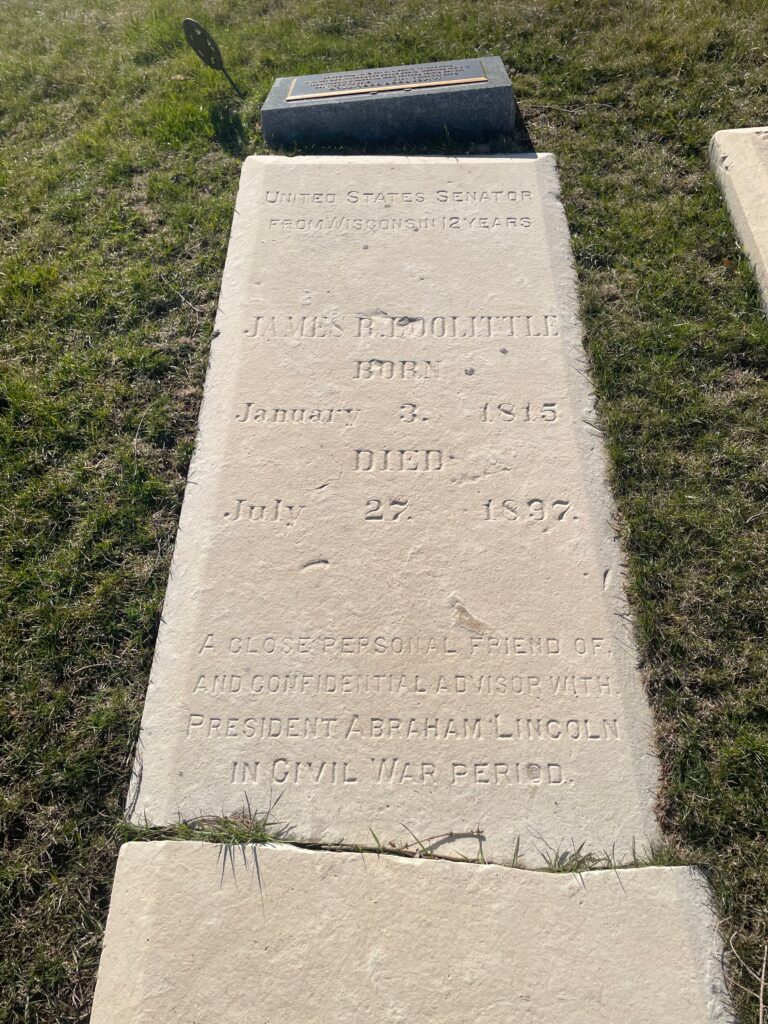Erik Visits an American Grave, Part 1,960
This is the grave of James Doolittle.

Born in 1815 in Hampton, New York, Doolittle went to local schools and then the Middlebury Academy before attending Hobart College, where he graduated in 1834. It was onto the law, passing the bar in 1837. He started a law practice in Rochester and then in Warsaw, New York. He became a locally prominent political figure and was district attorney for Wyoming County.
In 1851, Doolittle decided to move west and chose Wisconsin as his new home. These new states provided lots of opportunities for ambitious young men and it did not take long for Doolittle to be a rising legal figure and politician in Wisconsin. In 1853, he was elected Wisconsin Circuit Court Judge for the 1st Circuit and stayed in that role for three years.
Doolittle was a Democrat until 1850. Then the Fugitive Slave Act passed and he left the party, as did many northern Democrats who could not bear their party became the handmaiden of the slave power. If only there were any principled Republicans who would leave their party of open racism today, which doesn’t he require these people to not be racist, as would be the case with Doolittle, just to have some limits. Alas, there are not. He became a Republican shortly after that new party was formed in 1854 and although he was not really a major political figure, was sent to Washington as senator from Wisconsin in 1857. He was able to make his name by embracing a northern version of the states rights argument pushed by the South, saying that the South had no right to interfere in northern affairs if escaped slaves reached there, just as the North had no right to interfere with slavery. He also believed this and it would make him totally useless on Reconstruction later.
As senator, and he would serve two terms, Doolittle would be a very staunch Republican and a big supporter of Abraham Lincoln’s policies, enough so that this is the highlight of his life he chose to have on his gravestone, as you can see above. Doolittle was outraged by the bullshit constitutional arguments that the document allowed for secession and he proposed a constitutional amendment to explicitly ban the idea, though it didn’t go anywhere. But he remained quite conservative and during the war, would push for the colonization of Black people, supporting bills to fund getting rid of them for Liberia and Haiti. He would argue that true emancipation for Black people meant getting them away from whites, a self-serving argument for his own desire for a white nation. But let’s be clear, he absolutely was Lincoln’s man in Wisconsin and Doolittle basically handled patronage in the state as Lincoln’s proxy, angering more radical Wisconsin Republicans.
During the war, Doolittle was a huge supporter of everything Lincoln did, though he was hardly an insider. Just a solid vote. On policy, he really was mostly concerned with tribal issues. He worked a lot on the 1867 report The Condition of the Tribes, which was part of the effort to reduce war and would influence Grant’s Peace Policy. Don’t get me wrong here–there was still no respect for the Tribes from anyone, it was just more about changing them through assimilation such as stealing their children and putting them in schools while banning their languages with punishment such as beating instead of just killing them. Yay?
Doolittle never really got too far away from the Democratic Party though. He became a major critic of the Grant administration and the corruption around it. And don’t listen to those who have tried to rehabilitate Grant–he really was an incompetent president. But also it was because like a lot of white politicians in the North, he was super racist. He opposed the passage of the 15th Amendment because he believed states should choose who voted. And in fact, most northern whites opposed Black voting, which was why the amendment had to be created anyway, since northern voters were defeating measures for Black voting while Congress was demanding it for Southern states. And quite honestly, he always sucked on race. He was among the most conservative Republicans on race in the Senate and as even at the beginnings of talk about Reconstruction, long before Lincoln’s assassination, he embraced the most lenient possible terms. Basically, he remained a Democrat except for the narrow question of slavery and of course the principle of secession. Otherwise, let the South do what it wants.
So Doolittle supported Horace Greeley’s 1872 Liberal Republican bid for the presidency and then when the Democrats took it over, he went back to the party. He probably would have been Secretary of the Interior under Greeley due to his specialization in Indian policy. That killed his political career though. He then ran for election as the Democratic candidate for governor instead of the Republican in 1871 and lost. And the Republicans were sure not going to send him back to the Senate after his apostasy.
After the end of his political career, Doolittle moved to Chicago and opened a law firm. He was also president of the University of Chicago–which is not the same as the current University of Chicago. Eventually, he developed Bright’s disease and his kidneys failed. He died while in Rhode Island in 1897, just a mile or so from my house evidently. He was 82 years old.
James Doolittle is buried in Mound Cemetery, Racine, Wisconsin.
If you would like this series to visit other senators sent to Washington in the 1856 elections, you can donate to cover the required expenses here. Hannibal Hamlin is in Bangor, Maine and Trusten Polk is in St. Louis. Previous posts in this series are archived here and here.
